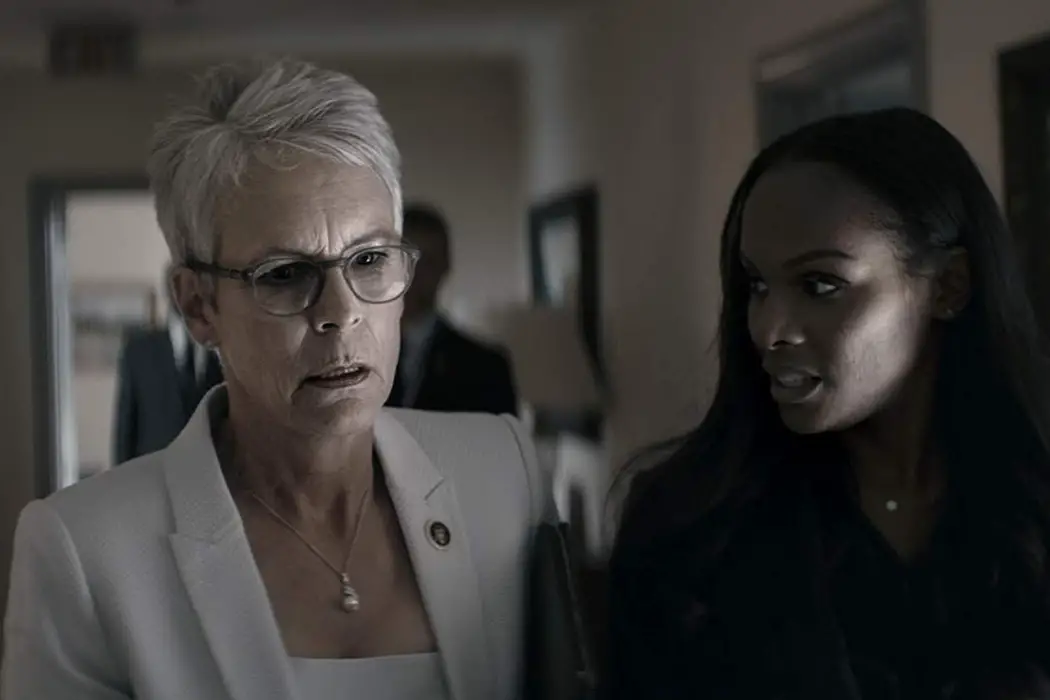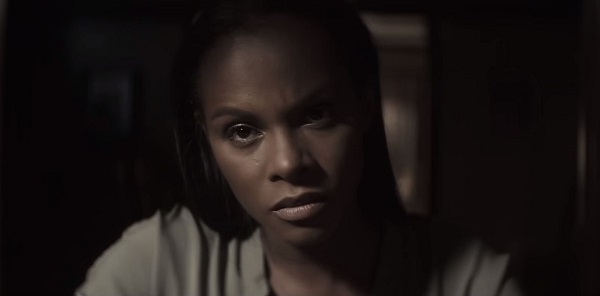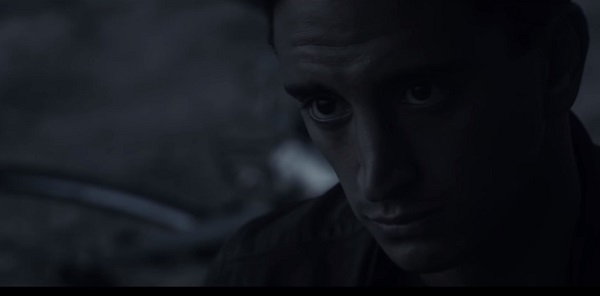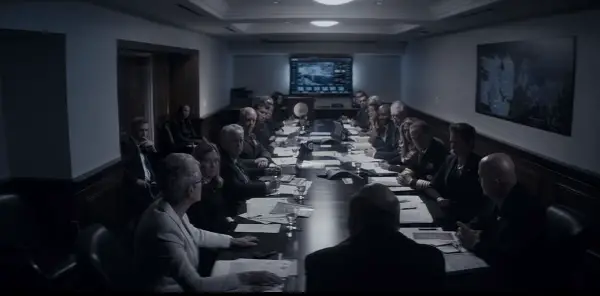AN ACCEPTABLE LOSS: In With A Bang, Out With Whimper

Julian is a playwright/movie-lover in New York City. He feels…
I don’t envy the task of making a political thriller in 2019. Plenty of people have written about Poe’s Law and the death of satire following the election of Donald Trump, but no one has talked about the effect on thrillers. The usual tropes involving cunning politicians just don’t seem to apply. How do you portray the government as guileful and scheming when the current administration seems to more closely resemble the meme of a bicyclist shoving a stick through their own front wheel? To his credit, director Joe Chappelle tackles that challenge with aplomb.
An Acceptable Loss is a tense slow-burning thriller following Libby Lamm, the former advisor the VP on the United States as she navigates her life which has been upended by a massive political scandal. The film flashes back and forth between the events leading up to the scandal, four years in the past, and present day where depending on who she’s talking to she’s either a hero or a war criminal. A salient topic. Or it could be, at least. But for a movie whose tension essentially rests on a moral question—Does the end justify the means? Was it…An Acceptable Loss?—it ultimately fails to present that question in a nuanced or compelling way.
An Effective Hook And A Patient Build
Although the payoff of the film is disappointing, the journey to get there is a fun one. Much of the audience will be hooked by the opening scene. Tika Sumpter’s Libby looks blankly into the camera with a thousand-yard stare while Jamie Lee Curtis, the VP of the United Sates, coldly congratulates her in voice over. “Libby…Libby..Libby…You did amazing work. I knew I could count on you.” A slight flicker in Libby’s eyes betrays a fierce internal conflict, and the audience is left to wonder what it is that she has done.

Writer/Director Joe Chappelle has no intentions of telling us just yet, and he exhibits considerable patience in the way he pushes the plot forward. Details of the mysterious event are meted out slowly. Vague allusions are made to a terrorist plot, and a covert military operation, but the actual scandal and Libby’s role therein aren’t revealed until well into the second half of the film. The audience is forced to suspend their judgement and watch closely while the pieces come together.
In the present, Libby is a guest professor at the fictional Grant University teaching a class called “Understanding Contemporary Warfare”. Her appearance on campus elicits protests, and brings our first introduction to Martin, a graduate student played with a quiet, simmering intensity by Ben Tavassoli. Like Libby, we are not quite sure what to make of him. He is a student in her class, and he watches her with growing obsession, following her around campus, across the city, eventually breaking into her house to spy more closely.
Nothing is offered as to Martin’s motivations or objective, and outside a few overly-expository lines from his roommate (“I get the impression you’re one of those incredibly gifted self-motivated types…”), we know almost nothing about him. He could be a run-of-the-mill stalker, he could be a government agent, or he could be a terrorist. We are given just enough detail to be hungry for more.
Strong Physicality and Emotional Peaks
Chappelle’s script is relatively light on dialogue and action. There is a great deal of sitting, watching, waiting, and thus a limited amount of conventional opportunities for the actors to make their mark. In a worse-cast movie this could be a serious drawback, but Tavassoli and Sumpter make for remarkably expressive statues.
And I don’t mean that backhandedly. When you have a director who loves close-ups as much as Chappelle seems to, it’s tremendously helpful to have actors who can tell a story through a clenched jaw or furrowed brow. Many of Sumpter’s lines sound clunky, particularly the more technical “political” dialogue, and she’s not always comfortable repeating them. Her character comes alive in the smaller moments, like when she listens anxiously to the wind blow through her creaky house, her eyes darting back and forth to the gun she keeps under her pillow.
Of course, both the director and the stars know how to lean into an emotional crescendo when it comes.
The scene which, in my opinion, steals the whole movie is when Tavassoli‘s Martin is finally caught by Libby breaking in to her house and is forced at gunpoint to explain what the hell he’s doing there. His performance is otherwise so emotionally muted and detached that when he finally gets a chance to raise his voice, choking back tears while he condemns Libby for her role in The Event which killed his father, the effect is disquieting.

I’d be remiss, too, if I didn’t compliment Curtis’s chilling performance as the war-hawk Vice President, the political brain behind the mysterious scandal. Her voice is breathy, yet ice cold, in a way that I can best describe as “What if a supervillain made ASMR videos?”. The effect is amplified by the film’s crisp, pared-down sound editing. It’s a voice that a person could imagine being manipulated by.
There’s a great deal in this movie that’s worthy of praise. And yet.
Dropping The Bomb and Missing The Point
Without spoiling too much, I can tell you that when the “truth” of the scandal is revealed, it is so comically over the top, so transparently evil, that I found myself wondering what the hell the point was of all that ambiguity.
The first two acts of An Acceptable Loss show Libby, Martin, and every other character with more than one line of dialogue all wrestling with the same question: What amount of violence is justifiable in defense of yourself or your citizens? It’s a complicated question, and complicated questions deserve complicated answers.

I’m not necessarily even talking about the role of the artist, and the need to “tell the truth” from ethical perspective. I’m talking about storytelling. And from a storytelling perspective, nuance is a lot more interesting.
Chappelle takes a controversial question and answers it in such an uncontroversial way that it makes the moral conflict of the movie feel totally manufactured. The tension is based on a false premise. In real life, the mysterious scandal would certainly have caused tremendous outrage, but it would have inspired very little debate. Some things are unambiguously evil. Some things are black and white. Good drama typically is not.
An Acceptable Loss: Conclusion
I feel like there’s such a fear among people writing political films over being caught on the wrong side of an argument. You need to make sure your bad guy is bad enough and the stakes are high enough, and the audience gets the point you’re trying to make. An Acceptable Loss open with a big, burning question mark that hooks you. It revels its own ambiguity, and forces you to constantly reconsider what “good” is and who you should be rooting for. In the end, rather than attempting to answer the difficult moral question at its core, it reframes the conversation into something simple.
The tagline of the movie is “The Truth Is Moving Target.” Chappelle either misses wide or doesn’t shoot at all.
What do you think? Are movies that wrestle with moral questions obligated to offer some kind of answer?
An Acceptable Loss will be released on January 18th, 2019.
Does content like this matter to you?
Become a Member and support film journalism. Unlock access to all of Film Inquiry`s great articles. Join a community of like-minded readers who are passionate about cinema - get access to our private members Network, give back to independent filmmakers, and more.
Julian is a playwright/movie-lover in New York City. He feels very strongly that anyone who didn’t ugly cry while watching Paddington 2 is probably a robot.












